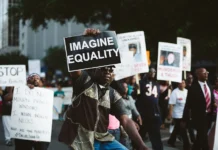The bishops of the Church of England have finally announced what it is they want to do at the end of the Living in Love and Faith process. In a press release this morning, their plans were made public.
They will be issuing an apology to Lesbian, Gay, Bisexual, Transexual, Queer, Intersex, and other people (LGBTQI+) for the “rejection, exclusion, and hostility” they have faced in churches. After what they describe as a 6 year period of listening and learning, they have decided they will “offer the fullest possible pastoral provision without changing the Church’s doctrine of Holy Matrimony for same-sex couples through a range of draft prayers, known as Prayers of Love and Faith, which could be used voluntarily in churches for couples who have marked a significant stage of their relationship such as a civil marriage or civil partnership.” They will also be replacing Issues in Human Sexuality, which binds clergy to celibacy outside of heterosexual marriage, with new pastoral guidance. The basis for this is given in large bold letters as “God is love, and those who abide in love abide in God, and God abides in them.” (1 John 4:16).
The proposals would not allow gay weddings in church, but there would be services of dedication and thanksgiving pronouncing God’s blessing on same-sex couples who marry or enter civil partnerships. They assert that “The formal teaching of the Church of England as set out in the canons and authorised liturgies – that Holy Matrimony is between one man and one woman for life – would not change.” Such things would be “would be voluntary for clergy to use”, we are told. Differences remain amongst the bishops over these issues, but we are assured that they wish to “emphasise a clear and strong desire to continue to “walk together” amid their differences.” The Archbishop of York describes this as “not the end of that journey but we have reached a milestone, and I hope that these prayers of love and faith can provide a way for us all to celebrate and affirm same-sex relationships.”
Responding in Love and Faith
There are so many things to say in response to this that it is hard to know where to begin. It may be best to outline some initial responses simply in bullet point form, before we get the more detailed proposals (on Friday apparently).
1. Sincere and specific apologies should be given.
The main thing I want to stress is that this is not an abstract academic issue but one which affects real people in the real world. Many have been hurt by the way they have been treated by the church. Sincere and specific apologies should be given to specific individuals where that is the case. We cannot apologise for following Christ and proclaiming his word, as if that was not somehow the best way for us all to live. But we can and should apologise where we have fallen short of the standards demanded of us in God’s word. What I want is for all of us who are fallen and sinful human beings to be made whole and holy by Jesus as we repent of our sins and believe in him. Everyone should be welcome in our churches to explore what that call to repentance and faith looks like in the twenty-first century; not just certain kinds of sinners, but all of us.
2. We can’t bless what God curses.
How can we promote and bless and celebrate and give thanks for things which God has not blessed? It is simply not good enough to throw 1 John 4:16 into this debate like a grenade and think that “God is love and those who abide in love abide in God” is sufficient to establish that he approves of same-sex marriage relationships. This text is beloved of revisionists in the current debate (and is probably where the title for Living in Love and Faith comes from) but is rarely unpacked in its context. What they seem to want it to mean is that it doesn’t matter who or what you love, God is in you if you love them. But is it possible to be living in sinful love, and to hold on to the true Christian faith? Or does orthodox Christian belief rule out certain kinds of love? I was denounced on Twitter by a leading gay activist clergyman recently for even using the phrase “sinful love”. Apparently, there’s no such thing as “sinful love”, only love — defined any way we want. And it’s homophobic to suggest otherwise, he said. But the rest of 1 John itself has much to say about what we love and desire. For example, chapter 2:
“Do not love the world or anything in the world. If anyone loves the world, love for the Father is not in them. For everything in the world—the lust of the flesh, the lust of the eyes, and the pride of life—comes not from the Father but from the world. The world and its desires pass away, but whoever does the will of God lives forever.” (1 John 2:15-17)
And here’s the thing: that phrase about “doing the will of God” there, defines what John means by love. Our loves are meant to conform to God’s loves. If our loves, lusts, and desires go against his will, we do not live in God and he in us, and we will not live forever. That’s what 1 John is saying. It chimes in perfectly with the rest of the New Testament which insists that certain behaviour (including certain sexual behaviour, but not only sexual behaviour) will exclude people from the kingdom of God (1 Corinthians 5; Galatians 5; Ephesians 5). That’s why this is so serious. We need to know what love is, and what faith is, if we want to live forever. Not all love leads to God.
So how can we tell people that something God has said will lead to death, will actually lead to life? Would it not be wicked of us to lie about something so important? Could we ever hope to avoid God’s judgment on us if we knowingly lead people astray like this? As Ros Clarke asked in a blogpost recently, how can we bless what God detests? Or as John Calvin once put it,
“How can any one have the effrontery to expect that God will aid him in accomplishing desires at variance with his word? What God with his own lips pronounces cursed, never can be prosecuted with his blessing.” (Institutes 3.7.9)
3. It IS a change of doctrine.
It is sleight of hand at best and a downright lie at worst to claim that allowing for the blessing of same-sex marriage relationships in church is not a change in the Church’s doctrine of marriage. Sex outside of heterosexual marriage is sinful, and has always been recognised as so by the church in every place and in every time. It has been recognised as so by the General Synod. To change this, in order to bless homosexual relationships, is not just a piece of minor tinkering.
The great theologian Thomas Aquinas said that if someone teaches that God is not a Trinity, or that sexual immorality is not a sin, then they are a heretic (see his commentary on Titus 3). That has always been the universal teaching of the church. To accept this change is to change our doctrine and practice, because our practice reflects our doctrine. It would make us heretics, just as surely as if the bishops told us we could use Unitarian prayers and were at liberty to argue against the doctrine of the Trinity. The bishops can’t make it a non-change simply by stating that this change is not a change. For us to swallow such casuistry requires far too much mental gymnastics. It convinces no-one.
Some say the status quo is the only option. I say that the church has already slipped away from reflecting orthodox doctrine in its recent changes to practice, and needs to return to orthodoxy, not just stick where it is. But what it cannot do is abandon orthodoxy while pretending it hasn’t, just because technically it won’t call same-sex blessings “marriage”.
4. Liturgy must reflect orthodox doctrine.
The law says, in Canon B4.1: “The Convocations of Canterbury and York may approve within their respective provinces forms of service for use in any cathedral or church or elsewhere on occasions for which no provision is made in The Book of Common Prayer or by the General Synod under Canon B 2, being forms of service which in both words and order are in their opinion reverent and seemly and neither contrary to, nor indicative of any departure from, the doctrine of the Church of England in any essential matter.”
So any liturgy which the bishops may be about to present to us or suggest to us for use in blessing same-sex marriage or civil partnership relationships simply cannot be permissible under canon law. There are no two ways about it: such liturgies would indicate a massive and obvious departure from the doctrine of the Church of England in a matter which both sides of this debate recognise as absolutely essential. If clergy can be disciplined or rebuked for tampering with liturgy, especially in wedding services, then why do the bishops think they can get away with proposing liturgies which signal the most fundamental shift in church doctrine since the Reformation? Do they expect us to swallow that whole?
Who do they think they are? Bishops are asked at their consecrations: “Will you teach the doctrine of Christ as the Church of England has received it, will you refute error, and will you hand on entire the faith that is entrusted to you?” Were they serious when they replied “With the help of God, I will”? What are we to conclude about God’s help, if they no longer will? It would be a fearsome thing to be led by those whom God had abandoned.
5. This compromise is unworkable.
Read it all at The Church Society



